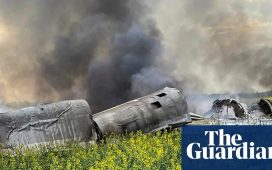UN secretary general António Guterres has said it is time to “truly flood Gaza with life-saving aid”, calling the starvation inside the enclave a “moral outrage”.
Mr Guterres also called for an immediate ceasefire between Israel and Hamas.
He spoke on the Egyptian side of the border not far from the southern Gaza city of Rafah, where Israel plans to launch a ground assault despite widespread warnings of a potential disaster.
More than half of Gaza’s population has taken refuge there.
The UN chief said: “Any further onslaught will make things even worse – worse for Palestinian civilians, worse for hostages and worse for all people in the region.”
He spoke before a long line of waiting trucks, a day after the UN Security Council failed to reach consensus on the wording of a resolution supporting “an immediate and sustained ceasefire”.
Mr Guterres repeatedly noted the difficulties of getting aid into Gaza, for which international aid agencies have largely blamed Israel.
“Here from this crossing, we see the heartbreak and heartlessness . . . a long line of blocked relief trucks on one side of the gates, the long shadow of starvation on the other,” he said.
He added: “It is time for an ironclad commitment by Israel for total . . . access for humanitarian goods to Gaza, and in the Ramadan spirit of compassion, it is also time for the immediate release of all hostages.”

Meanwhile, the United States has made a “bridging proposal” for the number of jailed Palestinians to be released by Israel in exchange for every hostage freed by Hamas in any new Gaza truce, an Israeli official briefed on the Qatar-hosted talks said on Saturday.
An Israeli delegation led by Mossad chief David Barnea has been in Doha for indirect negotiations with Hamas, which CIA director William Burns is helping Qatari and Egyptian officials to mediate.
Hamas wants to parlay any deal into a permanent end to the fighting – short of a formal peace, as the Islamist group is sworn to Israel’s destruction. Israel plans to pursue the war until Hamas’s governing and military capacities are dismantled.
“During the negotiations, significant gaps came to light on the question of the ratio” of prisoners to be released for each of the 40 hostages whose potential recovery is under discussion, said an Israeli official, who requested anonymity.
“The United States put a bridging proposal on the table, to which Israel responded positively. Hamas’ response is pending.”
The official provided no details on the US proposal. The US embassy in Israel did not immediately comment.
Asked about the hostage-to-prisoner ratio, senior Hamas official Sami Abu Zuhri referred to a proposal made by the group this month under which Israel would free between 700-1,000 jailed Palestinians in return for female, minor, elderly and infirm captives. Israel called that “unrealistic”.
Abu Zuhri noted Israel’s refusal to agree to call off its offensive, withdraw forces and allow displaced Palestinians to return to homes in the northern Gaza Strip: scenes of some of the most intense fighting in the almost six-month-old conflict.
“What America and the occupation [Israel] want is to regain the captives without a commitment to end the aggression, which means the resumption of war, killing and destruction, and we can’t accept that,” Abu Zuhri said.
US president Joe Biden, echoing Israel, has said Hamas must be eliminated.
Israel has expressed openness to suspending its offensive for six weeks and allowing more humanitarian aid into Gaza in return for the 40 hostages. That would leave behind 90 hostages, out of 253 seized by Hamas in its October 7th attack.
Under a previous truce, in late November, Israel released three jailed Palestinians, most of them young and accused of relatively light offences, for every hostage freed by Hamas, totalling 300 Palestinian prisoners for around 100 hostages.
Israeli officials have said they will likely have to agree to the release of a larger number of more senior Palestinian militants this time around.
Barnea flew back with other senior members of Israel’s delegation on Saturday evening, the Israeli official said, adding that their teams remain in Doha. The principals were prepared to shuttle back if the negotiations gain momentum, the official added.
The Hamas armed wing said on Saturday that an Israeli hostage had died due to “lack of medicine and food”.
Israeli officials have generally declined to respond to such announcements, accusing Hamas of psychological warfare. But Israel has itself declared 35 of the hostages dead in captivity.
Israeli prime minister Binyamin Netanyahu has vowed to press forward with military-approved plans for the offensive, which he has said is crucial to achieving the stated aim of destroying Hamas.
On Thursday, US secretary of state Antony Blinken said an Israeli ground assault on Rafah would be “a mistake” and unnecessary in defeating Hamas. An estimated 1.5 million Palestinians now shelter in Rafah.
[ We know what’s going on in Gaza, and won’t be able to say we didn’t ]
That marked a shift in the position for the US, whose officials have concluded there is no credible way for getting sheltering civilians out of harm’s way.
The Israeli military has said Rafah is Hamas’ last major stronghold and ground forces must target four battalions remaining there.
Israel’s invasion has killed more than 32,000 people, according to Gaza health officials, while leaving much of the enclave in ruins and displacing some 80 per cent of the enclave’s 2.3 million people.

Gaza’s health ministry does not differentiate between civilians and combatants, but has said women and children make up the majority of the dead. Israel blames Hamas for civilian deaths and accuses it of operating within residential areas.
Fighting raged on Saturday around Gaza’s largest hospital.
Israel’s military said it had killed more than 170 militants in Shifa hospital since the start of their raid five days ago.
Nearby Gaza City residents said that Israeli troops had blown up several residential buildings.
Gaza’s health ministry said the raid on the hospital complex had torched its departments treating patients with vascular disease.
It said Israel’s military had detained health workers, patients and relatives inside the complex. – Agencies















